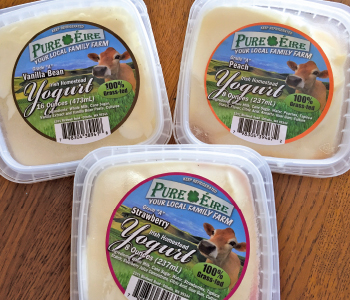Yogurt culture
This article was originally published in September 2016

Without sweeteners or added ingredients, plain yogurt is a canvas for creativity. Try it in place of sour cream on your favorite Mexican dishes, or use it to add moisture and flavor to baked goods. Our favorite way to eat it this time of year? With fall fruits — pluots, apples, pears — whether sliced fresh or stewed into a thick sauce. Add a dusting of cinnamon or cardamom, or a sprinkle of nuts or granola, and you have a fabulous, protein-packed breakfast or snack!
At PCC, we have a variety of organic and local yogurts that will make you want to experiment in all sorts of recipes and cuisines. For inspiration, visit our website: pccmarkets.com/recipes.
Five to try
- Pure éire Dairy — This Washington dairy makes creamy, ultra-thick whole-milk yogurt made from organic milk from 100-percent grass-fed cows. The dairy is Non-GMO Project Verified and Animal Welfare Approved. “We go above and beyond organic standards and believe the stress- free, healthy environment comes through in the milk,” says Pure éire’s Jill Smith.
- Straus Family Creamery — Milk and live active cultures are the only ingredients in this European-style organic yogurt. It’s rich and creamy but pourable and it comes from a family-owned dairy and creamery 60 miles north of San Francisco — the first certified organic dairy west of the Mississippi. Straus also makes exceptionally thick Greek yogurt (not pourable). Straus never uses stabilizers.
- Maple Hill Creamery — Whole-milk cream-on-top and Greek yogurts that are certified organic. It’s the only yogurt that’s certified 100-percent grass-fed by Pennsylvania Certified Organic (PCO). PCO grass-fed certification is considered the gold standard for grass-fed certification.
- Grace Harbor Farms — Tim and Grace Lukens make whole-milk, cream-top (non-homogenized) yogurt in Custer, Wash., just south of the Canadian border. The cows graze and enjoy a non-GMO diet; the Lukens switched away from corn and soy to be sure. The yogurt is thick, almost Greek-style, with a buttery taste.
- Redwood Hill Farm goat milk yogurt — Many people who are allergic to cow’s milk products or who suffer from lactose intolerance can eat goat milk yogurt. This Certified Humane brand is made from non-homogenized whole goat milk and has a velvety, smooth texture with a slight cream layer on top. It has a classic flavor that doesn’t taste too “goaty.”
The fat question
Why are consumers buying more whole-milk dairy? Besides the richer, creamier taste, they may be catching on to the health benefits.
Two recent studies conclude the consumption of whole-fat dairy is linked to reduced body fat.
Milk fat has its own unique mix of fats, many not found in any other foods. Organic, pastured and grass-fed milk contains even higher levels of these unique fats than conventional, grain-fed milk. Researchers have found that people with the highest levels of trans-palmitoleic acid (a “good fat” in whole milk) in their bodies have lower rates of obesity and diabetes, and that drinking whole milk increases the levels of this unique fat in our bodies.
- If you’re historically a nonfat yogurt-eater and find plain yogurt too sour, try switching over to yogurt with some fat. Many full-fat varieties have a softer, fuller flavor.
- If you’re freezing yogurt, use full-fat. It works much better in frozen recipes, such as frozen yogurt.
- Full-fat yogurt works better in cooked recipes. Yogurt with fat also performs better under heat. Just whisk it thoroughly and consider tempering it with a bit of warm sauce or soup (depending on what you’re making) before adding it to the rest of your hot dish.
Yogurt for health
- Yogurt is a good source of protein, calcium, riboflavin, phosphorus and magnesium. Many lactose-intolerant people can eat yogurt to get milk’s nutritional benefits without digestion problems.
- Regularly eating yogurt with live active cultures contributes to healthy digestion and can promote immune health.
Yogurt terms
Cultured — Made with live bacteria cultures. All yogurt at PCC is cultured but yogurts at other grocers may not be. Look for “made with live active cultures” on the label.
European-style — Cooked in a large vat instead of in individual cups. This enables the curds to be stirred in the vat, before they are poured into cups, resulting in a smoother, creamier yogurt.
Greek-style — Strained to remove moisture, producing a thick, high-protein yogurt with the consistency of sour cream.
